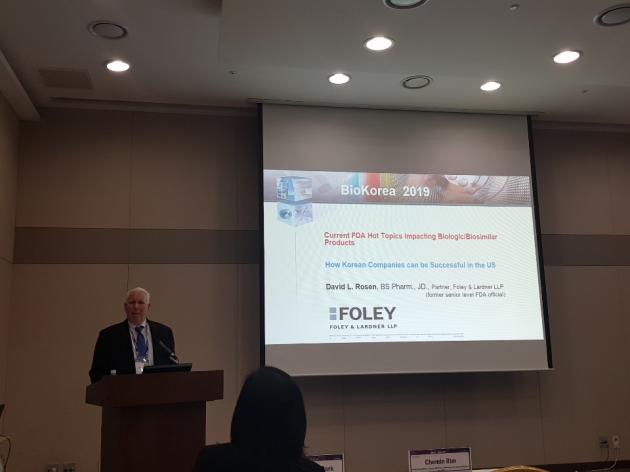With most Korean pharmaceutical and biosimilar companies aiming to launch their products in the U.S., the largest pharmaceutical market in the world, an expert advised how Korean companies can be more successful in America, at the BIO KOREA 2019 Thursday.

“Quality and data integrity are essential for a foreign company to come to the U.S.,” said David L. Rosen, a partner at Foley & Lardner LLP. “Some Korean companies have had success with their biosimilars in the U.S. market, but they have also had problems with the current good manufacturing practice (cGMP).”
It is essential for them to develop a drug with a sense of responsibility for making the products safe, Rosen added.
Rosen stressed that if such expectations are not met, companies can receive sanctions and penalties, including regulatory enforcement action, civil monetary penalties, and criminal liability.
“Import detention is something that everyone should be afraid the most as the Food and Drug Administration can block any import of the product,” Rosen said. “Therefore, companies have to respond to all warning letters and the concerns that the FDA has, and address them.”
The expert also gave his opinion on how to become a successful biopharma company in the U.S.
“It is important to have a plan such as a risk-based analysis and a written procedure,” Rosen said. “It is important to follow such written procedures as some companies completely disregard the plans that they have made.”
Companies also need to conduct regular audits, follow trend quality, train staffs, conduct internal investigations and ensure compliance with inspection and production of documents, he emphasized.
To achieve such goals, Rosen advised it is vital to be proactive with the FDA and communicate with them frequently.
“Companies that want to be successful in the U.S. need to engage with the FDA by participating in the notice and comment rulemaking process and holding pre-investigational new drug (IND) meeting and other formal and informal meetings,” Rosen said.
The communication between a company and the FDA has become essential during the past few years as significant safety issues have surfaced with many devices and drugs, leading to increased scrutiny from the U.S. Congress and the rise of public awareness and criticism.
“Such a backlash has caused the FDA to become more conservative on their decision making, greater scrutiny of the data, seeking consensus review, increased focus on FDA field inspections and user fee time pressure for completing reviews,” Rosen said.
Therefore, it is vital to understand the FDA’s expectation and seek guidance from the FDA and outside experts familiar with the matter, he added.
Pointing out that companies often understand their products more thoroughly than the FDA, however, Rosen said it is essential to educate the agency and hear their concerns and respond to them.
“Such a process is important as the FDA does not get it right every time,” Rosen said.

